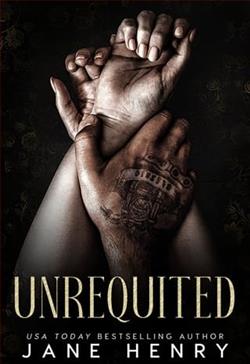Page 188 of The Daughters of Avalon
Myarmy, not yours—as though he already possessed them.
The bloody wretch had a title he didn’t deserve, and somehow, his father would still advocate to place him on the throne. The very truth of that was deplorable. Eustace wasnaught but a stupid little boy with an ego as immense as his head, and his villainy would someday be his undoing.
It wasn’t enough he was said to abuse his own wife, an esteemed princess of the House of Capet; he was a brutal liegeman as well. If Giles were the lady’s sire, he would gut the muckspout from belly to throat, and it was all he could do to look at him now.
The very fact that they could put Giles in a room with Eustace was dangerous—but nay, the simple fact that he could sit here at arm’s length, across a table, without shoving his blade down the boy’s throat was a testament to his years of careful training. But here and now, he sensed a test…
“Nay,” said the King, with a glance toward Giles. “You’ve cost me too much already. You will remain here, learn the true value of patience.”
“What, then, would you have us do?” ventured d’Lucy.
Once again, the King slid a glance toward Giles, and when he spoke, he spoke not to the high commander of his Rex Militum, but to Giles himself. “Indeed, I will send an army north, but I leave you and the Earl of Warkworth—” A pointed reminder of the title Giles had been awarded. “—in command. I shall have you ride north with one thousand men, and if you need more, send word via raven.”
So, then, the witch was still alive.
The King’s gaze was direct, his eyes changeable, betimes blue, betimes grey, depending on the light in the room. Right now, they were steely and dark, but with a flicker of gold from the candle turning before him.
Indeed, it was a test.
Giles tensed. If there was one thing he could not do it was intervene at York. He’d given his solemn oath to David of Scotland—and more, he’d promised his brother-by-law that he would abstain from the battles to come. For this promise, he wasawarded yards and yards of stone—stone he was now using to fortify the fortress Eustace had burned.
By the bloody cross, even if he did not, in fact, loathe Eustace—which he did—he was a man of his word. Clearly, the King already knew what David was planning, but still Giles would not betray his confidences by revealing his own intelligence. Whatever his response, he must remain circumspect, because, while he no longer intended to take a bride of Stephen’s choosing, he could not presently repudiate the man or his throne—not without consequence.
He said nothing for a long moment, merely regarded d’Lucy. The two men shared another meaningful glance.
D’Lucy said, “It would be my honor, Your Grace. I am quite certain the Earl of Warkworth understands the privilege you bestow upon him.”
From the back of the room came another voice, that of Maude’s. “As you must know, my lords, we have suffered a loss in his majesty’s Guard.”
Her quick-blue eyes flirted with Giles, though it was a dark flirtation, not one that could be remotely confused with matters of the flesh. She gave him a thin smile, and Giles was quick to catch her intimation.
“So, then… with Malcom Scott gone… are you saying you would like me to join your… Guard?”
“Aye,”said Maude. “How astute, my lord.”
Giles de Vere’s dark eyes glinted, though he’d slid a veil over them the instant he’d walked into the room. Only now and again, something like a glimmer of loathing slipped past, like a glimpse of morning light through heavy drapery, and she wondered if there could be truth to the rumors she’d heard about this man—that he was a member of the Papal Guard, aPaladin for God. Named for the twelve knights of Charlemagne's court, over whom Count Palatine had first been in command, the Guard had been recommissioned to the Vatican, in exchange for indulgences. But, if this were, in fact, true, why in God’s name would Giles de Vere leave an ambitious position to return to a northern province with so little promise? Moreover, why would the Church allow him to go? She wanted to know how far they could trust him, and his response would speak volumes.
“Alas,” he said. “I cannot.”
“Cannot? Or will not?” asked the King, and Maude frowned, annoyed, because Stephen’s ego was such that he could not fathom she had the guile to outwit a man—else he was far too stupid to realize what she was trying to do.
“I cannot,” answered Giles, and, then, dismissing Maude, he turned to address the King directly, and said, “Would you have me break an oath to God?”
Stephen frowned.
“In essence that is what you would be asking of me,” Giles said, and Stephen shoved his candlestick aside, his steely eyes darker now, unyielding. “And yet you have sworn to kneel. Are you telling me now that you will not do so?”
A muscle ticked at de Vere’s jawline, and Maude watched it, fascinated. “I considered you a man of your word,” raged Stephen. “As am I. But mark me, de Vere, if you have lied to me, I’ll not only return my men to Warkworth, as I have promised to do, but you will not live to see it burn a second time. If I do not take your head, I will lock you in the tower, and your Papal Guard be damned. By God, I have been called many, many things, but never once have I been called a liar, and I’ll not tolerate a liar in my company.”
Maude tried not to roll her eyes. But, of course, that wasn’t true. After all, her husband told the grandest lie of all. He’d knelt before his uncle with such a radiant smile, and he’d sworn hisallegiance to their cousin, only to rescind his vow the instant Henry gave up his ghost. Usurper they called him now—some to his back, some to his face.
Feeble. Ineffectual. Weak.
These were more of the things her husband was reputed to be, and most of these things were true.
Stephen of Blois had no spine at all when it came to disciplining those who deserved it. It was likely that, in the very near future, Eustace would need pay another visit to Warkworth because his father didn’t have the constitution to do what was necessary to ensure their son’s ascent to the throne. This was the one true cause she and Morwen Pendragon shared in common, and for all her annoyances, the Welsh witch was a necessary evil. If Maude ever hoped to see her son crowned in place of Duke Henry, she must endure. Alas, Morwen was not in residence today; Maude was, and if she had her druthers, she would see to it David of Scotland never succeeded in taking York. It pained her immensely that her mother’s brother would cast her away in favor of hisotherniece—the one with whom Maude shared a name and to whom her uncle would so readily bow.
Saints abide! All her life she’d been forced to share what she held dear—her name with a cousin she despised and her husband with his mistresses. But it wasn’t King Henry’s daughter whose arse was planted on the throne; it was hers. And it was not Duke Henry who would triumph in the end, it was Eustace, even despite that the stupid fool seemed so ill-prepared to receive it.















